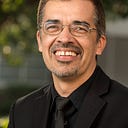Message to Emerging Race, Ethnicity and Politics (REP) Scholars During Turbulent and Uncertain Times by Dr. Tony Affigne
Dear Race, Ethnicity and Politics Colleagues:
The future is indeed fraught with uncertainty, and it’s clear the structure of academia will change dramatically. Many of those changes were already underway, but have been exacerbated by the COVD-19 pandemic of 2020. Others arise because higher education has pursued an unsustainable business model predicated on exorbitant tuition, extreme inequality among institutions, and federal/state policy which privileges the authoritarian cultures and economic interests of the private sector — while downsizing scholars’ pursuit of the public interest and service to public needs.
That said, our craft is more essential than ever. Witness the powerful role of social science/political science analysis in recent months. Widely publicized studies of racial disparities in police violence, health care access and quality, and the like, don’t just write themselves. A wide range of scholars across the social and medical sciences have done our part to inform and analyze, even as broader social movements have seized the public narrative in unprecedented ways.
Our REP scholars have become more visible in recent years, in media coverage of elections, and that’s just one way that REP scholars’ production of knowledge is helping inform public debates and has become a critical (and relatively new) feature of the political terrain.
My point being, even as we acknowledge — and when we can, actively resist — the profound deconstruction which is imminent in our profession, we should remember that OUR WORK IS IMPORTANT, and we have a responsibility if we can meet it, to NOT GIVE UP, but to continue that work. We should also adapt, as we can, to changing conditions, creating and seizing opportunities to inform the public wherever we can — both inside and outside the academy — using all the tools and technologies available today. This is already happening.
From my perspective, intellectuals as a class, serving as educators, indoctrinators, and facilitators, aren’t going to disappear from the public discourse. If we abandon the field, they just won’t be OUR intellectuals, and they won’t be serving a wider public interest, let alone the needs of la gente. They’ll be serving the money that pays them, and nobody else.
So, please add my voice to those encouraging everyone, young scholars and “not so young,” to hold fast and carry on. Do the work, find and use your public voice, and never forget why you got into this work in the first place. If “Ph.D.” had no social power, had no meaning, it would be an easy thing to acquire. But in reality, those credentialing initials are EXTRAORDINARILY hard to get; the academy has always resisted our very presence, when we bring the voices and world views of our peoples, into the halls of intellectual power; and ESPECIALLY in the coming days and years of crisis, our families and communities need us to stand strong, courageous, and outspoken.
There will be obstacles and inequities and indignities, and not all of us will be able to persist in the face of insurmountable economic, spiritual, or personal barriers. But if you can, my friend — please stay the course.
Abrazos,
Tony
—
Dr. Tony Affigne, MPA, PhD, is a Professor in the Department of Political Science, Program in Black Studies (Affiliated), Program in Latin American and Latina/o Studies (Core) at Providence College, Rhode Island. Dr. Affigneholds a Ph.D. in Political Science and Public Policy from Brown University. He also holds an M.P.A. from University of Rhode Island -Public Administration and an AB in Social Theory from Brown University.
.
